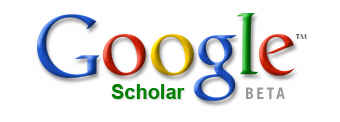The Scholarly Search Engine: Google Scholar
Web search leader Google on Wednesday unveiled Google Scholar, a new search product aimed at helping users search scholarly literature such as technical reports, theses and abstracts.

Google Scholar enables you to search specifically for scholarly literature, including peer-reviewed papers, theses, books, preprints, abstracts and technical reports from all broad areas of research. You can utilize Google Scholar to find articles from a wide variety of academic publishers, professional societies, preprint repositories and universities, as well as scholarly articles available across the web.
Google Scholar searches a specific subset of Google's index and covers a wide range of academic content areas from medicine to information science and from engineering to elearning matters.
Just as with Google Web Search, Google Scholar orders your search results by how relevant they are to your query, so the most useful references should appear at the top of the page.
This relevance ranking takes into account:
a) the full text of each article as well as
b) the article's author,
c) the publication in which the article appeared and
d) how often it has been cited in scholarly literature.
Google Scholar also automatically analyzes and extracts citations and presents them as separate results, even if the documents they refer to are not online.
To find scholarly articles and papers just type the author's name in the search box.
If you've authored a number of articles and want to narrow your results, use an "author:" prefix. For example, author:mccarthy. To find your articles on a given topic, add relevant keywords to the search. E.g., author:mccarthy artificial intelligence.
To search for specific articles start with the last name of the article's first author, then add several title words as a phrase in quotes. For example, author:witten "string theory dynamics".
You will also notice that some of the results that will come up in Google Scholar are marked [citation] and it is not possible to click on them.
These are articles that Google has indexed as having references to in other scholarly articles, though Google scholar hasn't found the actual document online. A large fraction of scholarly literature is still offline, and until these papers are available online, citation-only results help researchers find as much relevant information as possible.
Google Scholar indexes also books and you may run into a book result when a document that Google scholar has included in its index references a specific book. You can use Library Search to locate a library near you that has the book, or Web Search to find online stores where you can buy it.
If you are a publisher of scholarly works or just simply an author and would like to have your content included in Google Scholar these are your options:
a) If your content is publicly accessible online, it may be simply a matter of time before it appears inside Google Scholar. It is also true that not all publisher web sites and articles are suitably configured for indexing by Google web crawling software.
b) If your content is not publicly accessible online you can email Google Scholar directly at:
mailto:scholar-publisher@google.com
In some cases you may get an HTML abstract when you click on a result labeled PDF. It is evident that in those cases you will need to be a subscriber or to access the article from a specific location (e.g., a university library) to read the full text on the publisher's site.
Please note that "Google does not receive compensation if you decide to buy a subscription to a journal or access to a particular article."
Google Scholar is a free service and, at least initially, it will not carry advertisements.

blog comments powered by Disqus